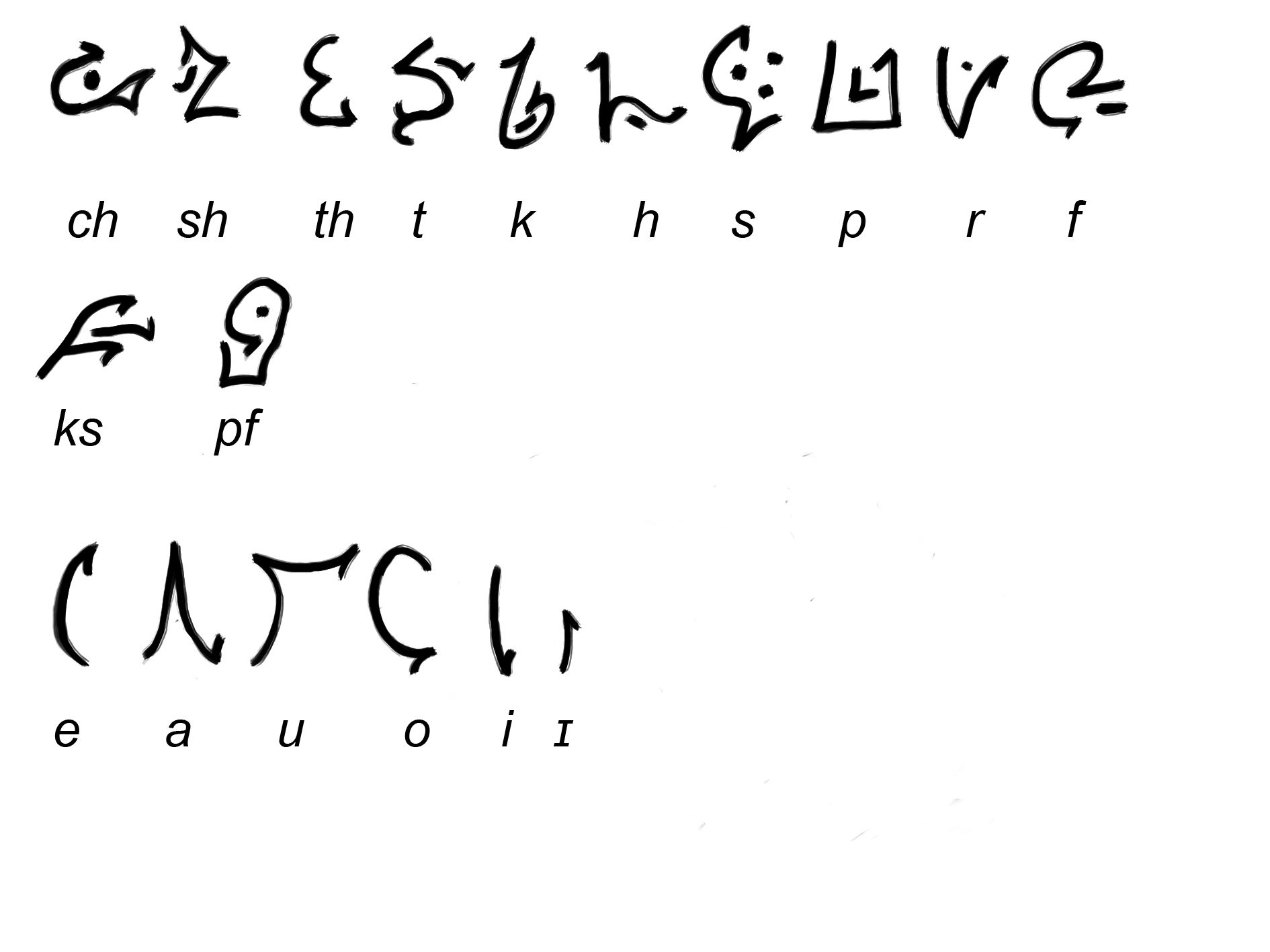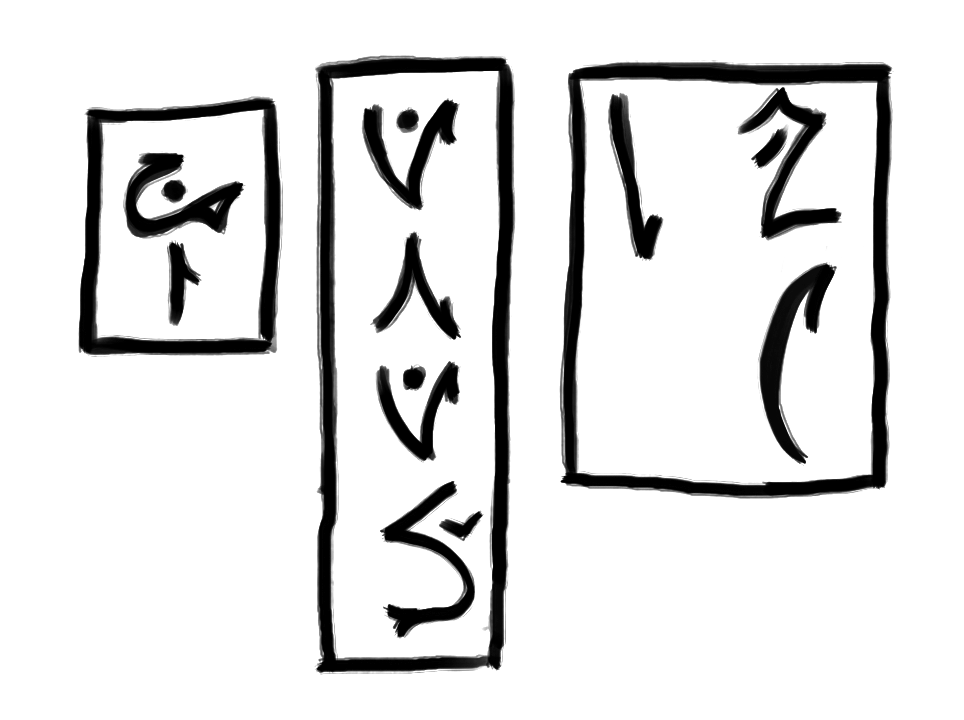Mak'al
The Servant's Tongue
Striisk ku estoss. Striisk thif 'e estoss sfass chiio i estoss'rarr'esfreth shests.
Summary
Mak'al is a language long forgotten. It is mostly found on ruins and jewelry dating back millennia ago. Its origins are largely unknown by the scholars of the hearthlands, only suspected to be a constructed language. Few even know that, and even fewer know more. Those who do, know that it was created to be used by the servants of the ancient Krastux, a people know very little about. It has almost no voiced consonants which make for a language that is easily whispered. This is because the Krastux couldn't stand the sound of their servants and wanted to have a universal language for them. I say servants, but in actuality they were slaves. Slaves who used their vocal cords to make sounds and speak. This was something the Krastux couldn't do and so they made a language that was easily understandable for them, sounded a lot like their language, was silent and could be used to uniform the tongues of their various subjects. In the modern age of Mithra, Mak'al is rarely seen. There are a few scholars who have deciphered the various runes that make up their language but there are no actual known speakers. Some of the temples in the white wastes and other northern parts of Mithra, where the Krastux held their power, have strange glyphs and runes that could be deciphered using Mak'al. These runes tell stories about the ancient keepers of which even less is known.Dictionary
DictionaryPhonology
Consonant inventory: /f h k p s sː sːː t ɹ ɾ ʃ ʔ ʧ θ/
| ↓Manner/Place→ | Bilabial | Labiodental | Dental | Alveolar | Palato-alveolar | Velar | Glottal |
|---|---|---|---|---|---|---|---|
| Stop | p | t | k | ʔ | |||
| Affricate | ʧ | ||||||
| Fricative | f | θ | s sː sːː | ʃ | h | ||
| Approximant | ɹ | ||||||
| Tap | ɾ |
Vowel inventory: /e i ɪ o u a/
| Front | Back | |
|---|---|---|
| High | i ɪ | u |
| High-mid | e | o |
| low | a |
Spelling rules:
The script used for mithra is made up of a series of runes. For the S, the amount of dots is used to implicate the length of the s sound. Furthermore, this script is written in from left to right sentence wise, but downards word wise. Words will get boxed in but apostrofes will be next to eachother in the same box. A word will be written downward with the next word in the sentence being placed next to it. An example is the sentence "I am a dog"
The sentence in Mak'al is: Chi rart ii'she
Romanization
| Pronunciation | Romanization |
|---|---|
| Start of word: ks | k's |
| i | ii |
| ks | x |
| sː | ss |
| sːː | sss |
| ɹ | r |
| ɾ | r |
| ʃ | sh |
| ʔ | ’ |
| ʧ | ch |
| θ | th |
| ɪ | i |
Grammar
Main word order: Subject-Verb-Object-Oblique. "Mary opened the door with a key"Adjective order: Adjectives are positioned before the noun but as a prefix
| Adjective ending with a vowel | Adjective -Ending vowel + ' + Noun |
| Adjective ending with a consonant | Adjective + ' + Noun |
Adposition: Prepositions except Possession is postpositions
Pronouns
Mak'al has two pronoun cases.- Subjective case: Pronouns used as subjects
- Possessive case: Pronouns used to express ownership of something.
| 1st singular | 2nd singular | 3rd singular | 1st plural | 2nd plural | 3rd plural |
| chi> /ʧɪ/
I |
striisk> /stɹisk/
you |
ssorth> /sːoɹθ/
he, she, it |
ess> /esː/
we |
sfakt> /sfakt/
you (all) |
sssat> /sːːat/
they |
| 1st singular | 2nd singular | 3rd singular | 1st plural | 2nd plural | 3rd plural |
| stret> /stɹet/
my, mine |
fropt> /fɹopt/
your, yours |
shrass> /ʃɹasː/
his, hers, its |
kress> /kɹesː/
our, ours |
shests> /ʃests/
your, yours (all) |
sfo> /sfo/
their, theirs |
Verbs
Future tense is indicated with the word: strep
| Future particle | strep> /stɹep/
future tense particle |
| Present | No affix
chiipt> /ʧipt/ |
| Past | If starts with vowel: Prefix ts-
Else: Prefix tse- tsechiipt> /tseˈʧipt/ |
| Remote past | If starts with vowel: Prefix iɹ-
Else: Prefix iɹe- iirechiipt> /ˈiɹeʧipt/ |
Imperfective aspect
The ‘imperfective’ aspect refers to ongoing actions, such as I am studying, and habitual actions, such as I study (every night). It is indicated with the word: Ku imperfect particle = ku> /ku/Dictionary
Common Unisex Names
Names in Mak'al are meant to de"humanize" (if that word can be used, considering humans were probably little more than primal animals when the language was spoken) the servant and enhance the Krastux. Masters had nicknames like whip, pain, high, ruler, master (probably the translation of the word Krastux) or lord. Contrasting this, servants and slaves had names like worm, fly, filth and snake.
Out of Character
Don't think that all Mak'al users were either slaves or Krastux. There were plenty of servants that had high power and constructed their buildings, wrote their books, guarded their castles and took care of their buisness. The Krastux were, besides being merely pawns themselves, rulers that ruled from high up their ivory towers. They rarely bothered with the business of the lower folk. They had their servants for that. Temples like the one the woodelf Red and Bernard of Redhill visited, were all built by these "servants", most without a single Krastux ever setting foot in it.






I like the overlong grade for s (s::)! I think it would fit better if you also had length distinction in other consonants and vowels. Languages like Estonian have three lenghts in Vowels, and Inari Sámi in consonants too!
<3